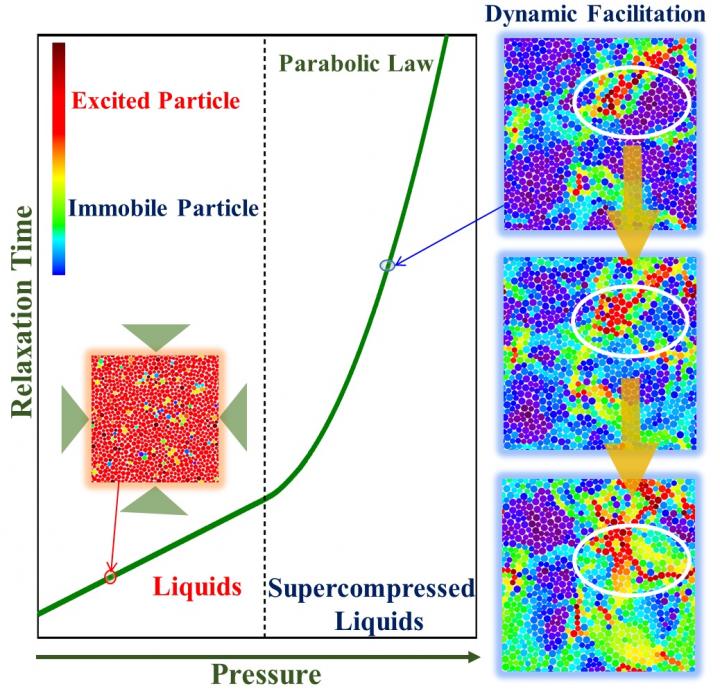

Facilitation of excited particles (red) is observed in athermal molecular systems under "supercompressed" liquids. What is facilitated is the ability of the constituent particles to structurally relax, giving rise to correlated and cooperative dynamics.
Credit: NITech
Multiple theoretical models have been developed to explain the relaxation dynamics of materials that form glasses. One such model is the dynamic facilitation theory, which predicts that the dynamics of systems are heterogeneous and relaxation displays parabolic behavior.
“The general predictions of the dynamic facilitation theory hold for thermal systems,” lead researcher Masaharu Isobe explains. “However, this theory had not been extended to systems controlled by pressure.”
The researchers numerically investigated the glass transition behavior of two-dimensional binary mixtures of hard particles (hard disk) systems considering pressure rather than temperature as the major variable. Their aims were to determine general properties of slow relaxation under supercompressed conditions and investigate if dynamic facilitation theory was applicable to hard disk systems at high pressure.
They used the event-chain Monte Carlo method to calculate the equilibrium states of various hard disk systems at different pressures. This method allowed the equilibrium phases in the systems–including amorphous, mixed crystalline, crystalline-amorphous composite, and crystalline–to be accurately identified.
As a result, the researchers could probe the relaxation dynamics in the desired supercompressed region. They found that their results corroborated the dynamic facilitation theory in two ways.
“We confirmed that localized effective excitations randomly distributed in the equilibrated systems facilitated relaxation and average relaxation times extended with increasing compression,” Isobe says. “Both of these results indicate that the dynamic facilitation theory is applicable to supercompressed hard disk systems.”
These results expand fundamental knowledge of the behavior of materials under pressure, and may contribute to development of glasses with desired properties for specific applications.
###
The article, “Applicability of Dynamic Facilitation Theory to Binary Hard Disk Systems,” authored by M. Isobe (Nagoya Institute of Technology, Japan), A. S. Keys and D. Chandler (University of California, Berkeley, USA), and J. P. Garrahan (University of Nottingham, UK), was published in Physical Review Letters (DOI: 10.1103/PhysRevLett.117.145701).












